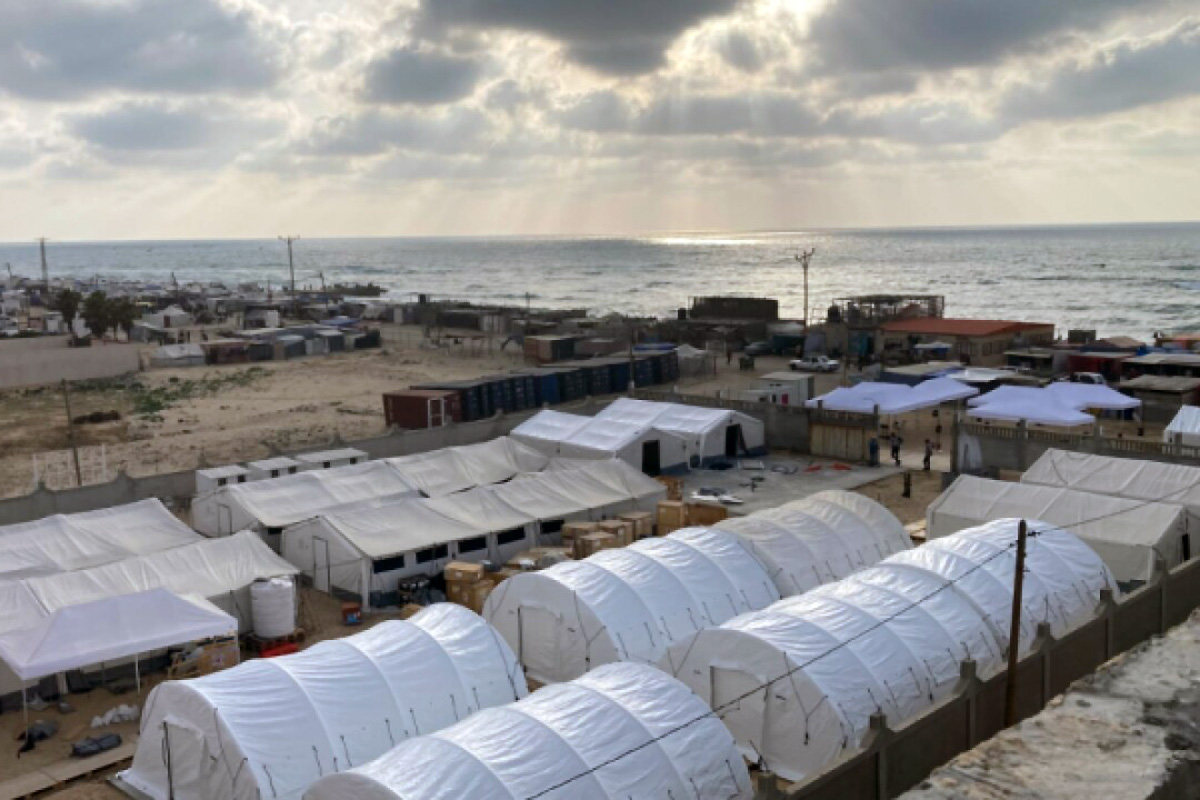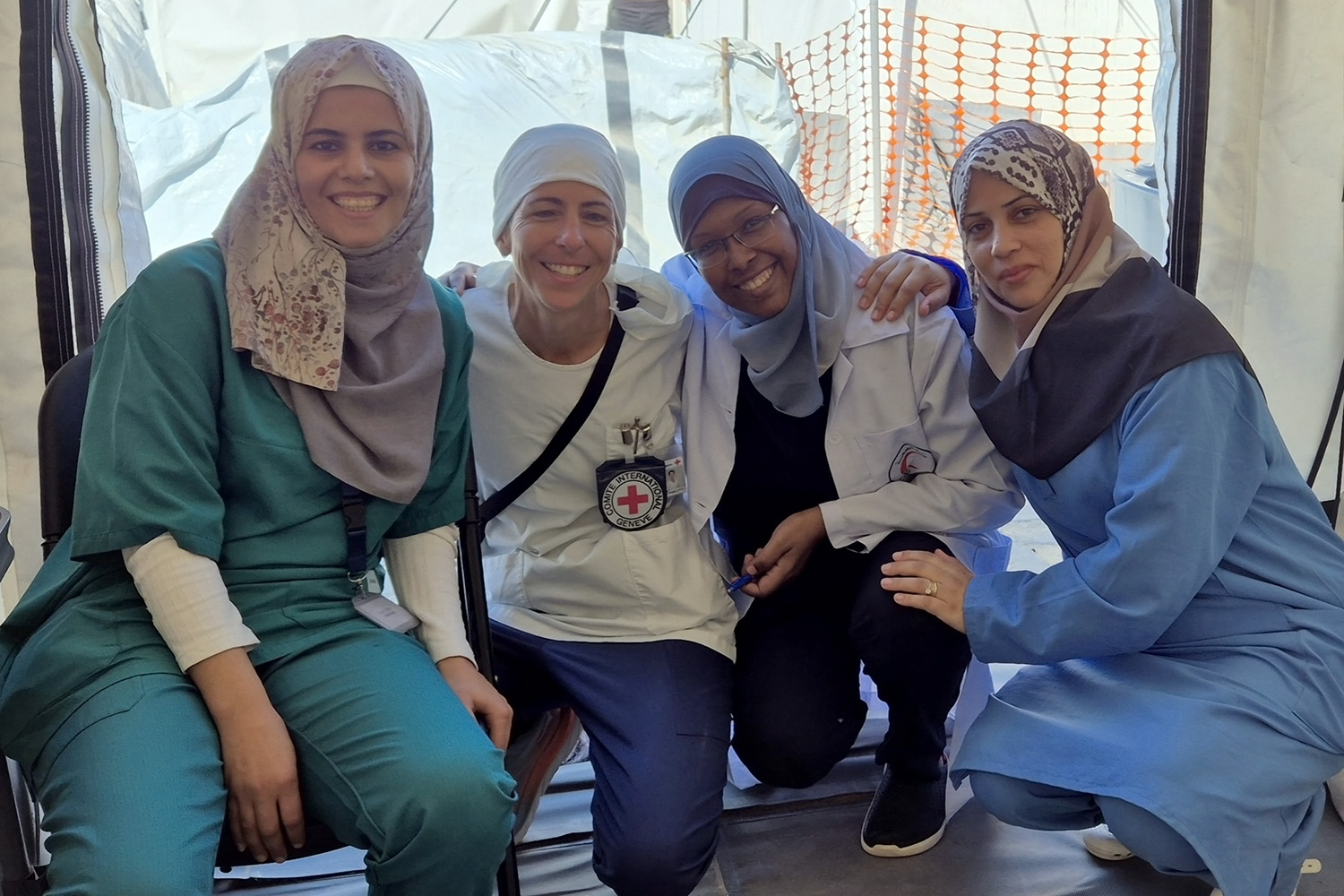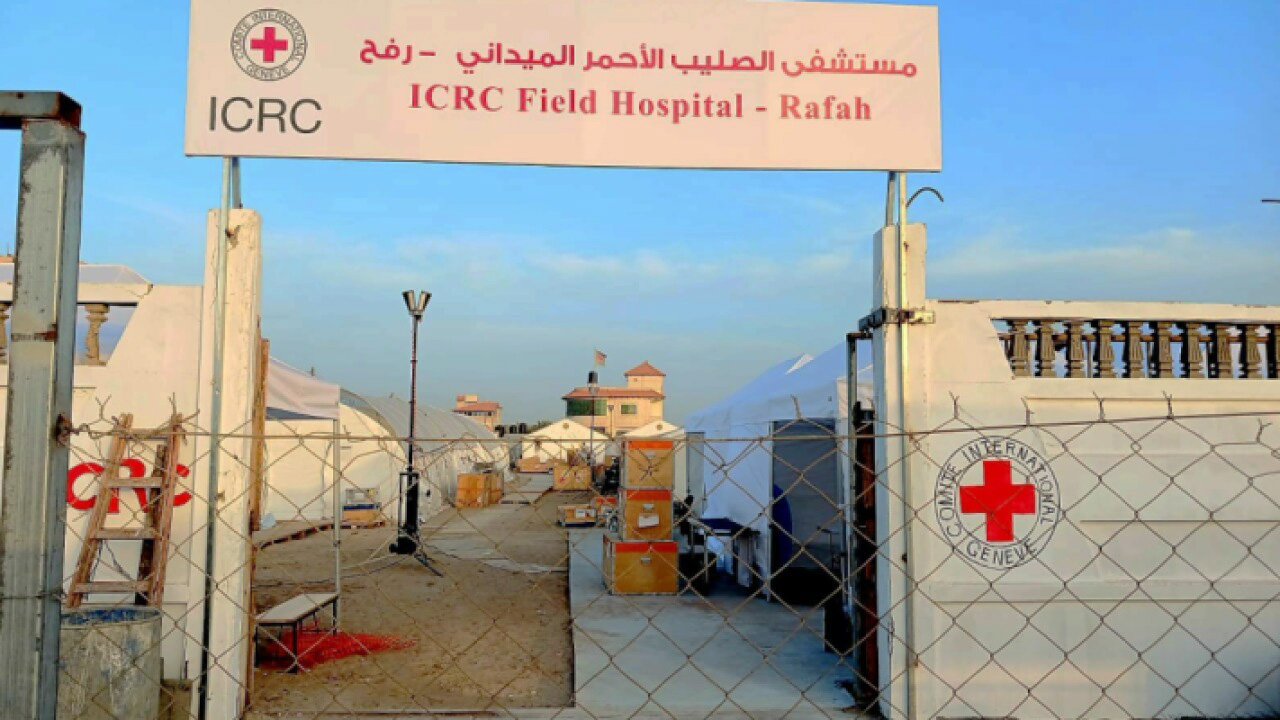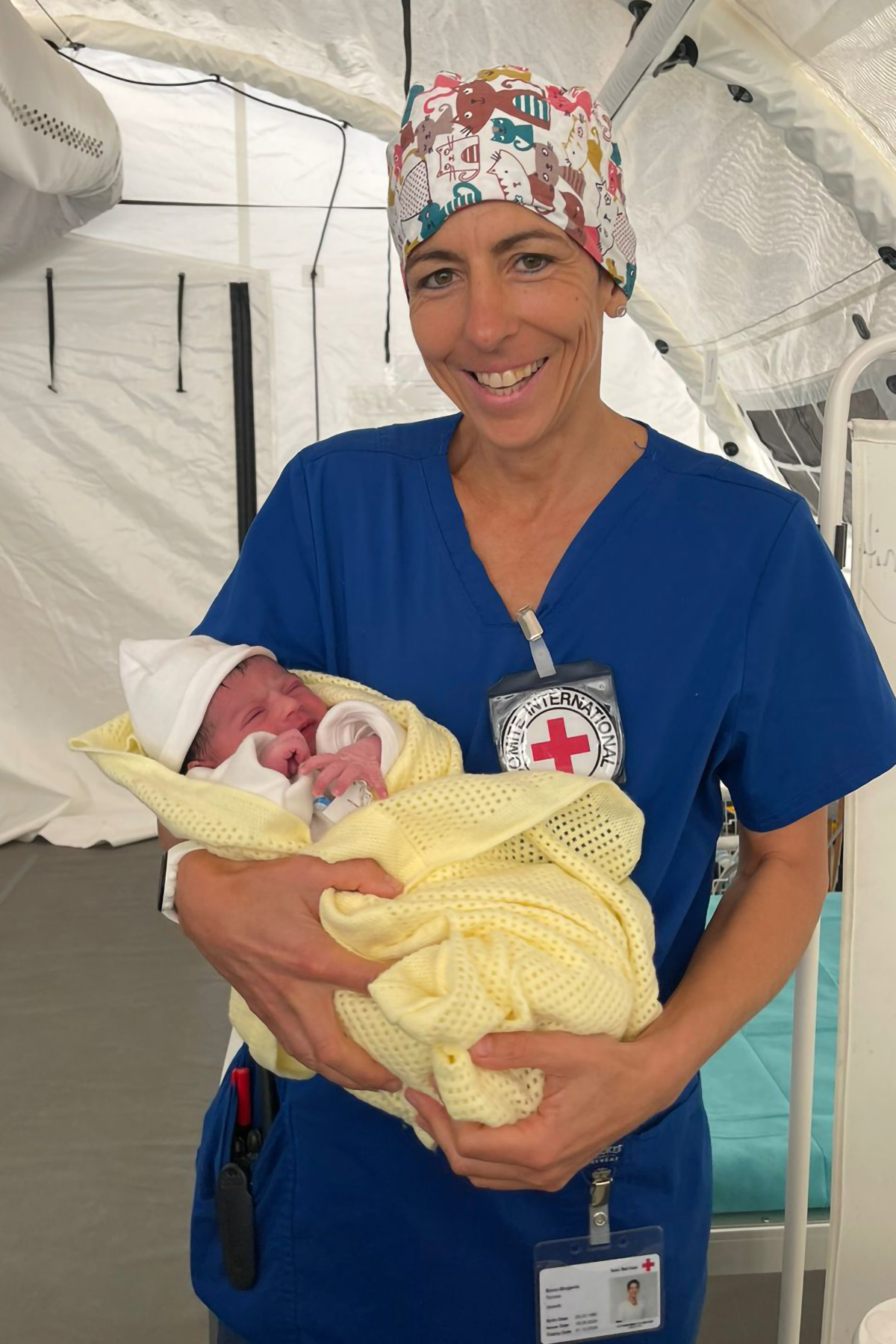Swiss midwife responds to call for aid from Gaza

Swiss midwife Tamara Bonc recently spent five weeks in the Red Cross Field Hospital in Gaza. How did she experience the job of delivering babies in a warzone?
At the Red Cross Field Hospital in Rafah, southern Gaza, some things are just normal, says Tamara Bonc. The evening view over the Mediterranean, for example. The clinicExternal link, where the Swiss midwife worked for five weeks in October and November as part of a Red Cross mission, is built on the coast, and when the light fades on the water, sunsets are spectacular.
“You think, OK, well at least some things can’t be changed,” Bonc tells SWI swissinfo.ch in grey, pre-Christmas Zurich.
Other marks of normality at the 60-bed hospital: the pragmatic daily interactions with women coming in for check-ups; the range of medical facilities available, despite the temporary nature of the place; the joy of childbirth; the chats with colleagues; the scrolling through newsfeeds; the anticipation of US election results.
But the reality of Gaza isn’t far away. Pregnant patients often arrive on donkey-pulled carts. Many staff work several jobs: there’s lots to do, and besides, they need money to keep up with skyrocketing food prices. For newborns, malnutrition looms. The hospital, while impressive, is ultimately made of tents. “There’s not much privacy,” Bonc says.
And just a few weeks before US voters go to the polls ten thousand miles away, Hamas leader Yahya Sinwar is killed by Israeli troops just across town, in Rafah.
“When you only look at the sunset, or even at the people who are still on the beach and in the water, you can almost forget what’s going on,” Bonc says. “Sometimes it does you good. But when you turn to look in the other direction, at the destruction, the huge camps of tents, it becomes pretty clear where you are.”

Born midwife
Bonc, 44, never wanted to be anything but a midwife. “When I was five, I went into hospital for a tonsil operation, and we were next to the birth section, and the urge just never left,” she says.
The desire to work with pregnancies wasn’t the only factor. There was also the independence that can come with the job. The social importance of the role also became clearer to her, as did the realisation that birth is only a small part of it – just as important is helping parents and babies settle into a routine at home.
After qualifying in 2002, Bonc moved around, living in various cities in Switzerland, always working as a midwife. She began to combine hands-on bedside work with more advisory responsibilities; she also got active in the Swiss Midwives’ Association.
+ Heard something about Swiss diplomacy that you’d like us to fact check?
However, sensitive souls can feel cramped in a privileged country. “I had no influence over the fact that I grew up here in Switzerland,” Bonc says. She wanted to contribute more. She got involved with the Red Cross, signed up to an emergency pool of experts ready to go to crisis areas if needed.
Two stints in Bangladesh followed – refugee camps, where the situation was tough, but not one of open conflict. Then the call came in April 2024: a midwife was needed in Rafah, the Gazan city where an estimated two-thirds of the population had fled after war had engulfed much of the rest of the enclave. “I thought about it for half a day, talked it over with my partner, then said yes.”
The field hospital in Rafah was set up in May 2024 by the International Committee of the Red Cross along with 11 national Red Cross societies, including Switzerland’s. The 60-bed hospital caters for emergency surgical care; obstetric/gynecological, maternal, and newborn care; pediatric care; and has an outpatient department. Mass casualty management and triage capacities are also included.
The war in Gaza broke out after Hamas fighters killed 1,200 people in southern Israel and kidnapped 251 others on October 7, 2023. By the start of December 2024, almost 45,000 people had been killed in Gaza and more than 100,000 injured, according to figures by the Hamas-run health ministry. Of the 36 hospitals serving the Gazan population of 2 million before the war, 17 are still partially functional, the World Health Organisation saysExternal link.

Daily drones
And so, in October, she set off. Zurich to Amman, then a day-long security briefing, a slow journey through the West Bank and Israel, a heavily guarded entry into Gaza, and a bumpy ride south towards Rafah near the Egyptian border.
The posting of just over a month is hardly an eternity. And yet it can feel that way. Bonc works every day and is on call 24/7. In five weeks, she loses five kilos.
She also loses the sense of time. “We’d been warned that a week is like a month,” she says. And with the general tiredness, the days seeping into each other, the limited radius of movement available – hospital to accommodation and back – it all becomes a bit of a blur.

More
Switzerland and UNRWA: timeline of a rocky relationship
There’s also the stress of being on constant high alert. You never know when you’re going to be told to head to a sandbag-filled bomb shelter. Sounds of war seep through: bombs, sirens, gunshots. Yet what really sticks in Bonc’s mind is the buzzing: drones, circling constantly above. “Not those cute little drones, but big ones, like lawnmowers”. Nights are not easy.
Bonc says she was never afraid. “I simply trusted that there were people looking out for us.” Not even the reports of plundered aid convoys, nor the threats to humanitarian workers, changed this – at least for her. Back in Switzerland, family and friends are naturally concerned, and happy to get an occasional reassuring WhatsApp message.
Meanwhile the days roll by. After a 7.30am start, Bonc’s job is largely to oversee the work of the local midwife staff, as well as to jump in for emergency deliveries. She doesn’t have to do this often: the staff – Palestinian women – are extremely well-qualified, Bonc says. They’re also more aware of local customs than her. For example, more than in Switzerland, labour is very much a woman’s world: only twice does a man show up.
The overseeing of supplies is trickier. Antibiotics are scarce; she has to ration. There is only a single baby cot in the hospital; she manages to cobble together another. Nappies have shot up in priceExternal link by a few hundred percent since the start of the war; washable textile versions provide a short-term alternative.

Consternation, miscomprehension
Meanwhile the war continues. The start of Bonc’s mission comes just a week after the first anniversary of the October 7 Hamas attacks on Israel. There’s a succession of big events: Sinwar is killed (October 16), Donald Trump wins (November 6), Israel and Hezbollah reach a ceasefire (November 27), Assad falls in Syria (December 8).
What does she think of it all? Bonc hesitates. Before going to Gaza, she says, she mainly focused on reading up on the history of the region. She wanted to know how such an intractable conflict could have come about in the first place. It’s only since returning to Switzerland that she has waded into debates, she says – via podcasts, for example.
As a Red Cross delegate, however, she can’t say anything politically compromising. The incredibly charged nature of the war in Gaza has brought rhetorical and real attacks on aid workers; not just the embattled UNRWA but also the Geneva-based International Committee of the Red Cross (ICRC), which has been accused of being biased towards the Palestinian cause.
After reflection, and a glance at the Red Cross press officer who was also at the interview in Zurich, Bonc says the only word she can offer is “incomprehension” – about how such a tragedy can happen, and why the world has allowed it to happen.
Naturally she knows there are many conflicts raging around the world. “But after you’ve been there, you can’t shake off the sense of consternation,” Bonc says. “It was like this after my first mission in Bangladesh, it’s always like this after coming back.”
And now that she is back – in the hyper-modern conveniences and Christmas markets of Zurich? She’s staying put, at least for a while. She needs time to work through her stint in Rafah, and to readjust to the luxuries and pressures of life in one of the world’s safest countries.
However, she will volunteer again in the future. She’d like to go back to Gaza, she says. Although preferably when the war is over. “Maybe I could just go there to the beach and look at it again,” she says.
Edited by Benjamin von Wyl/livm/ts

In compliance with the JTI standards
More: SWI swissinfo.ch certified by the Journalism Trust Initiative










You can find an overview of ongoing debates with our journalists here . Please join us!
If you want to start a conversation about a topic raised in this article or want to report factual errors, email us at english@swissinfo.ch.